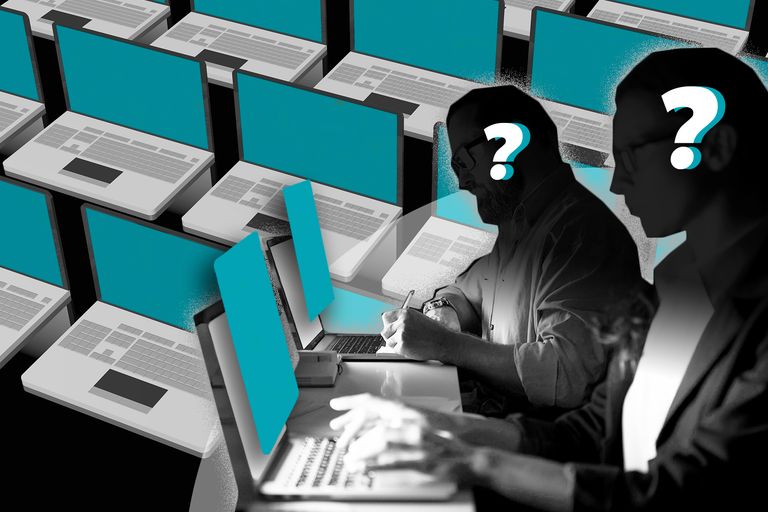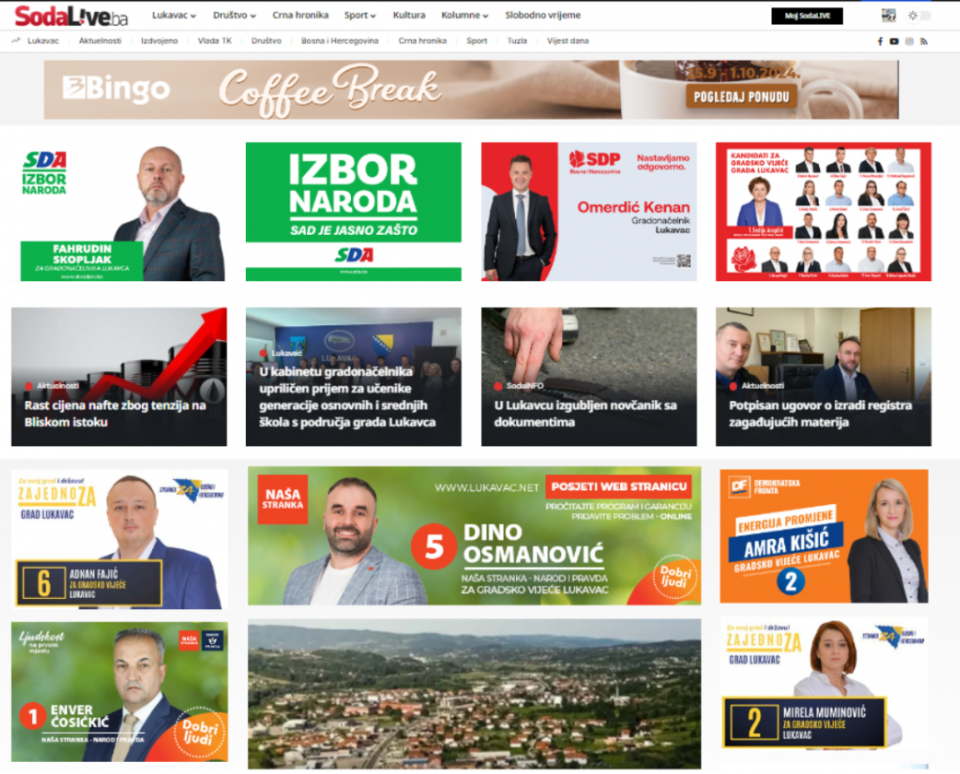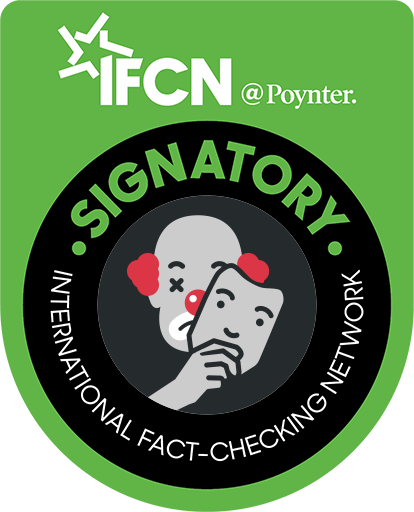Since March of this year, the Election Law of Bosnia and Herzegovina (BiH) has required online media outlets reporting on election campaigns to disclose information about their ownership. This change was imposed by a decision of the Office of the High Representative (OHR), though it has been unclear from the outset who would enforce it and how. We investigated how well this regulation is being followed in practice.

Photo: Raskrinkavanje.ba
Anonymous web portals in Bosnia and Herzegovina (BiH) and the wider region have been thriving for years, often serving as creators and distributors of disinformation, including election-related content. Currently, Raskrinkavanje’s database contains over 1.000 web portals that do not disclose ownership or editorial information. These web portals make up almost a third of the database, which includes over 3.500 media outlets whose claims have been fact-checked at least once in the past seven years.
In March of this year, the Office of the High Representative (OHR) in Bosnia and Herzegovina introduced amendments to the Election Law. Among these changes was a revision to Article 16.1. which now requires online media outlets “that choose to report on the election campaign” to provide public and transparent information about their ownership. The amendments also mandate that online media covering the election campaign adhere to the principles of “balance, equal access, fairness, and impartiality”, as outlined in Article 16.2. of the law.
However, the amendments do not assign any specific institution the authority to enforce these new provisions, nor do they impose penalties for non-compliance. From the outset, it has been unclear how these rules would be applied to anonymous web portals whose ownership is unknown and which may not even fall under the jurisdiction of BiH institutions.
During the election campaign, we monitored online media coverage to determine whether the amendments to the Election Law have led to greater transparency or improved balance and impartiality in the content published by web portals covering campaign-related topics. Here are the results of our monitoring.
Anonymous web portals actively involved in the campaign
Our monitoring of the election process revealed that information about local elections, political parties, and/or candidates appeared on dozens of web portals that do not disclose their ownership. In other words, a portion of online media that “chose to report” on the elections failed to provide public and transparent ownership information, as required by the High Representative’s decision.
Some of these web portals are already established as local media, with names suggesting their focus on specific cities (Banjaluka (.com), Tuzla live, Gradacacki glas, Bijeljina press and 072 info), as well as those with significant social media followings (Crna hronika, Pressmedia). Nevertheless, none of these web portals have publicly and transparently disclosed their ownership, as mandated by the new OHR regulation.
These anonymous and/or web portals with non-transparent ownership are not merely relaying information about the campaign – some are actively involved in it. Political entities from BiH directly advertise on web portals whose ownership is almost entirely unknown. Candidate and political party advertisements appeared during the campaign on web portals such as Bijeljina press, Glas regije, Info birac, Hercegovina press, and Kakanj info. Some web portals also published sponsored articles from certain political parties (1, 2, 3). In some cases, such as the web portal SodaLive, sponsored content from political parties dominated the site’s content during the pre-election period.

Photo: Screenshot
Some of these web portals conducted their own “polls” about the election results, presenting them as relevant indicators of voter preferences, despite the fact that they were not conducted on representative samples or in accordance with public opinion research methodologies. Raskrinkavanje analyzed such examples in this analysis, highlighting polls published on anonymous web portals like Balkan X, Mahalla, Gradacacki glas and Tomislavnews.
Some of the web portals we monitored violate not only the obligation to disclose ownership but also the principles of “balance, equal access, fairness, and impartiality”. Several anonymous web portals reporting on the election campaign in BiH exhibit clear bias, openly promoting certain candidates while criticizing – or more often – attacking and insulting others.
For instance, our content analysis of web portals like Pijemont, Glas Laktasa and Banjaluka-24 features these examples. All three are, at the same time, completely anonymous and partial in their reporting on local elections. On Pijemont, for example, Drasko Stanivukovic is frequently criticized or insulted, while his opponent in the Banja Luka elections, Jelena Trivic, is portrayed in an overwhelmingly positive light. Banjaluka-24, on the other hand, adopts the opposite stance, praising Stanivukovic and reserving derogatory language for Trivic.
Comments from institutions
According to the new provisions of the BiH Election Law, online media reporting on election campaigns must disclose ownership information. However, the decision imposed by OHR does not specify how this rule should be enforced if an anonymous web portal does cover election-related topics. The OHR’s amendments lack clarity regarding steps for reporting and sanctioning such violations, and they do not define penalties for non-compliance with the new law.
Currently, hundreds of anonymous web portals operate in BiH. Not only do they fail to disclose ownership, but they often conceal it during website registration, making it difficult to determine even the location of those managing the sites. There is no legal requirement for online media to register or disclose ownership. The Communications Regulatory Agency (CRA) in BiH does not have jurisdiction over online media, which remains outside any regulatory framework.
Online media and print outlets are part of a voluntary self-regulation system that relies on adherence to the Code of Ethics for Print and Online Media in BiH, overseen by the Press and Online Media Council. However, the Council has no authority to impose sanctions, and its decisions are not binding.
We reached out to the OHR, the Central Election Commission, and the Communications Regulatory Agency for comments on the monitoring findings and clarification on who is responsible for implementing the new provisions of the Election Law.
The Central Election Commission responded that it was unable to provide a detailed answer but confirmed that it has no jurisdiction over media. According to the Election Law, “the Communications Regulatory Agency is responsible for electronic media, while print and online media fall under the purview of the Press and Online Media Council in BiH”. The Central Election Commission also confirmed that the Election Law does not impose penalties on web portals that fail to comply with its provisions.
The Communications Regulatory Agency stated that enforcing these provisions is challenging, “especially due to the absence of an online media registry and adequate legal regulations on media ownership transparency, which would address the issue of anonymous web portals beyond the election period”. CRA recommended reporting issues related to the application of the Election Law to relevant institutions to improve its enforcement. CRA also emphasized that it only regulates electronic media, while online media falls under the jurisdiction of the Press and Online Media Council.
In line with these recommendations, we sent our monitoring findings to the Press and Online Media Council, but we had not received a response by the time of publication. The Office of the High Representative also did not respond to our inquiry.
Do anonymous web portals have anything to worry about?
Keeping their web portals anonymous allows the owners to publish content without revealing their identity, thereby avoiding accountability. Raskrinkavanje’s experience shows that such content often includes clickbait headlines, fake news, conspiracy theories, and a wide range of pseudoscientific advice, sometimes bordering on quackery. These web portals are typically driven by economic motives, generating revenue through services like Google AdSense. Many of them create networks or ”farms” of interconnected anonymous web portals and Facebook pages to maximize their earnings, publishing any content that attracts enough attention for monetization. In this black market of web portals, anonymity is a crucial asset, and owners often react aggressively when information about their ownership is disclosed.
However, many anonymous web portals also publish political content, often favoring specific candidates during election campaigns. In such cases, in addition to seeking profit, these web portals aim to influence the information environment or even directly affect voter decisions. Some of these web portals are likely created by political parties or campaign teams.
Anonymity makes them an effective tool for bypassing regulations on political advertising and often basic standards of civility in public discourse. In recent years, we have seen examples of anonymous web portals created to “launder information”, that is, publish disinformation, hate speech, and personal attacks, which are then picked up by other media outlets, including public broadcasters, allowing them to distance themselves from responsibility for the content.
The first election campaign taking place after the OHR’s decision shows that the new Election Law provision requiring online media transparency remains largely unenforced. The law lacks clearly defined enforcement mechanisms, including penalties and the authority to implement them. Without these measures, the provision is merely a symbolic gesture on paper.
(Authors: Marija Ćosić and Tijana Cvjetićanin, Raskrinkavanje.ba)
